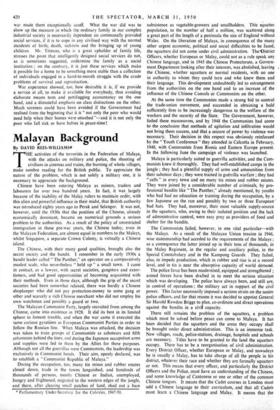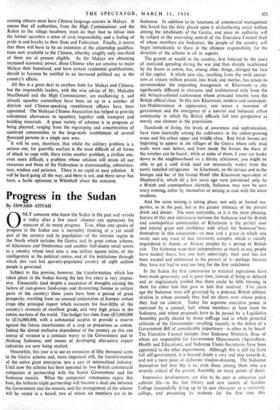Malayan Background
By DAVID REES-WILLIAMS*
THE activities of the terrorists in the Federation of Malaya, with the attacks on military and police, the shooting of civilians in cinemas and trains, the burning of whole villages, make sombre reading for the British public. To appreciate the nature of the problem, which is not solely a military one, it is necessary to appreciate the background.
Chinese have been entering Malaya as miners, traders and labourers for over two hundred years. In fact, it was ,,largely because of the inability of the Malay rulers to maintain order, with this alien and powerful influence in their midst, that British authority was introduced eighty years ago to Perak and Selangor. It was not, however, until the 1930s that the position of the Chinese, already economically dominant, became on numerical grounds a serious problem to the authorities. As a result of the policy of unrestricted immigration in those pre-war years, the Chinese today, even in the Malayan Federation, are almost equal in numbers to.the Malays, whilst Singapore, a separate Crown Colony, is virtually a Chinese • island.
The Chinese, with their many good qualities, brought also the secret society and the bandit. I remember in the early 1930s a bandit leader called " The Panther," an operator on a comparatively modest scale, who nevertheless " held up " a small town. I came in contact, as a lawyer, with secret societies, gangsters and extor- tioners, and had good opportunities of becoming acquainted with their methods. Even in those days, although the grip of the secret societies had been somewhat relaxed, there was hardly a Chinese shopkeeper who did not pay protection-money to some gang or other and scarcely a rich Chinese merchant who did not employ his own watchmen and possibly a guard or two. .
The Malayan Communist Party, largely recruited from among the Chinese, came into existence in 1928. It did its best in its limited sphere to foment trouble, and when the war came it executed _the same curious gyrations as European Communist Parties in order to follow the Russian line. When Malaya was attacked, the decision was taken to train groups of Communists as saboteurs and fifth columnists behind the lines, and during the Japanese occupation arms and supplies were fed to them by the Allies for these purposes. Although not all the guerrillas were Communists, the leadership was exclusively in Communist hands. Their aim, openly declared, was to establish a " Communist Republic of Malaya."
During the occupation, too, many tin mines and rubber estates closed down, trade in the towns languished, and hundreds of thousands of persons, mostly Chinese or Indian, unemployed, hungry and frightened, migrated to the western edges of the jungle, and there, after clearing small patches of land, eked out a bare * Parliamentary Under-Secretary for the Colonies, 1947-50. subsistence as vegetable-growers and smallholders. This squatter population, to the number of half a million, was scattered along a great part of the length of a peninsula the size of England without Wales. On the liberation of Malaya, in consequence of the many other urgent economic, political and social difficulties to be faced, the squatters did not come under civil administration. The"District Officers, whether European or Malay, could not as a rule speak any Chinese language, and in 1945 the Chinese Protectorate, a Govern- ment Department looking after their interests, was abolished, leaving . the Chinese, whether squatters or normal residents, with no one in authority to whom they could turn and who knew them and their language. This development undoubtedly led to estrangement from the authorities on the one hand and to an increase of the influence of the Chinese Consuls or Communists on the other.
At the same time the Communists made a strong bid to control the trade-union movement, and succeeded in obtaining a hold sufficiently firm to be increasingly dangerous to the welfare of the workers and the security of the State. The Government, however, foiled these manoeuvres, and by 1948 the Communists had come to the conclusion that methods of agitation and infiltration would not bring them success, and that a seizure of power by violence was necessary. Their decision in this respect was obviously reinforced by the " Youth Conference " they attended in Calcutta in February, 1948, with Communists from Russia and Eastern Europe present. In the following June the campaign of violence was launched.
Malaya is particularly suited to guerrilla activities, and the Com- munists knew it thoroughly. They had well-established camps in the jungle ; they had a plentiful supply of arms and ammunition from their saboteur days ; they were trained in gudrrilla warfare ; they had " cells " in every town and on many tin mines and rubber estates. They were joined by a considerable number of criminals, by pro- fessional bandits like "The Panther," already mentioned, by youths who had had no education or training during the occupation, by a few Japanese on the run and possibly by two or three European' bad hats. They had, moreover, their most valuable supply-source. in the squatters, who, owing to their isolated position and the lack of administrative control, were easy prey as providers of food and shelter for the bandits.
The Communists failed, however, in one vital particular—with the Malays. As a result of the Malayan Union tension in 1946, wise statesmanship had acceded to the requirements of the Malays ; as a consequence the latter joined up in their tens of thousands, in the Malay Regiment, in the regular and auxiliary police, in the Special Constabulary and in the Kampong Guards. They failed, also, to impede production, which in rubber and rice is at a record level, and in tin is near the absorptive capacity of world demand.
The police force has been modernised, equipped and strengthened ; armed forces have been drafted in to meet the serious situation which was developing. The police have always been, and still are, in control of operations ; the military act in support of the civil power. This factor necessarily imposed a serious strain on the senior police officers, and for that reason it was decided to appoint General Sir Harold Rawdon Briggs to plan, co-ordinate and direct operations against the bandits in a civil capacity.
There still remains the problem of the squatters, a problem which must be solved before peace can come to Malaya. It has been decided that the squatters and the areas they occupy shall be brought under direct administration. This is an immense task. New villages, roads, police-stations, drainage, hospitals and schools are necessary. Titles have to be granted to the land the squatters occupy. There has to be a reorganisation of civil administration. Every District Officer, whether European or Malay, and nowadays he is usually a Malay, has to take charge of all the people in his district, whatever their race and whether they are formally squatters or not. This means that every officer, and particularly the District Officers and the Police, must have an understanding of the Chinese, and some knowledge of Cantonese or one or other of the common Chinese tongues. It means that the Cadet courses in London must add a Chinese language to their curriculum, and that all Cadets must learn a Chinese language and Malay. It means that the
existing officers must have Chinese language courses in Malaya. It means that all authorities, from the High CoMmissioner and the Rulers to the village headmen, must do their best to infuse into the former squatters a sense of civic responsibility and a feeling of pride in and loyalty to their State and Federation. Finally, it means that there will have to be an extension of the citizenship qualifica- tions now available to the Chinese, whereby roughly only one-third of them are at present eligible. As the Malays are obtaining increased economic power, those Chinese who are anxious to make Malaya their homeland, and have certain residential qualifications, should in fairness be entitled to an increased political say in the country's affairs.
All this is a great deal to swallow both for Malays and Chinese, but the responsible leaders, with the wise advice of Mr. Malcolm MacDonald and the High Commissioner, are swallowing it, and already squatter committees have been set up in a number of districts and Chinese-speaking resettlement officers have been appointed. The Malayan Chinese Association has helped to provide subsistence allowances to squatters, together with transport and building materials. A great variety of schemes is in progress or being planned, ranging from the regrouping and concentration of scattered communities to the large-scale resettlement of several thousand persons in a single new area.
It will be seen, therefore, that whilst the military problem is a serious one, for guerrilla warfare is the most difficult of all foi-ms of attack to cope with, there exists another problem, a civilian one, even more difficult, a problem whose solution will strain all- our resources and those of the Federation in statesmanship, administra- tion, wisdom and patience. There is no rapid or easy solution. It will be hard going all the way, and there is not, and there never has been, a facile optimism in Whitehall about the outcome.







































 Previous page
Previous page